More actions
| (117 intermediate revisions by 6 users not shown) | |||
| Line 1: | Line 1: | ||
{{Info religion | {{Info religion | ||
|image = | |image = Unionismshield.png | ||
|pronunciation = | |pronunciation = Union-ism | ||
|origins = Emperor [[Theomar]] | |origins = Emperor [[Theomar]] | ||
|deities = The Everwatcher and various other Gods and Goddesses | |deities = The Everwatcher and various other Gods and Goddesses | ||
|subsects = | |subsects = | ||
* | * The Evintarian Cult | ||
* | * The Guided Cult | ||
* The Armageddon Cult | |||
|}} | |}} | ||
Unionism is the world's second-largest religion only trailing shortly after Estelley, on account of the Ailor people being more religiously divided, though it is speculated that Unionism will become the largest religion within a century at least. Unionism at its core is a global unification movement that proclaims the benevolence of the divinely inspired Emperors of the Regalian Empire to bring order, stability, and law to the world that is filled with chaos and strife. Unionism is the only Religion on Aloria that incorporates Gods of their subjugated or annexed people, preserving their culture and traditions as a part of a larger collective. | |||
==Origins== | ==Origins== | ||
The | Unionism was founded several years after the Establishment of the Regalian Empire, roughly speaking in the year 10 AC. The exact year date is unclear, because Theomar did not publish the Creed until some time after he received his first visions, and so some theological debate exists on the exact founding year. Emperor Theomar was the first prophet of the faith and recorded the visions of the Everwatcher who joined with his soul, thus Theomar became the first Vessel-Emperor. Unionism has since its founding had a strong upward trajectory of converting those of other Religions to it, but also just population growth in general due to its strong message of expansion of the state and family. It is currently the second largest Religion in the world, only slightly outclassed by Estelley on account of there being more Elves widely speaking. | ||
==Central Message== | |||
The central message of Unionism is that the world is a wretched test of virtue for all mortals who reside in it, and that the greatest test of all is the unification of the world under the secular authority of the Emperors of Regalia. In essence, the faith preaches that the world is filled with chaos and suffering and that only through the guidance of the Regalian Empire's authority it can be unified. When this task called the Great Way is completed, the Everwatcher will create paradise on the world, ending all death and suffering, and bringing back all those who have passed into the afterlife to live among the now immortal mortals in a state of forever paradise. | |||
==The Great Way== | |||
The Great Way is the task of the faithful to bring about a world-spanning Regalian Empire under the secular authority of the Regalian Emperors. This explicitly does not mean the eradication of other Religions, it purely means that the whole world should follow Regalian state law and be obedient to it, while preserving their own customs and traditions. However, many also interpret it as an implicit call to eradicate other Religions. Unionism is a complicated Religion that professes to do a lot of good, but that is inherently hampered by the selfish wishes of mortals and the self-interested preaching of the clergy. It contains themes of righteousness bogged down by dogmatic narrow-mindedness, and stagnating beliefs. | |||
==The Afterlife== | |||
Unionism's afterlife is far less colorful or pleasure-inducing than many other Afterlives, it is in fact quite simple. Unlike the paradises of liquor and endless banquets, Unionism's afterlife is a somber staircase upon which all the faithful sit in waiting, gazing down at the world of mortals and watching events unfold until it is their time to descend back down to the land of the living when the Everwatcher creates paradise. There is a sense of togetherness for those who will return to loved ones in the Afterlife, but also a sense of waiting for eternity due to the slow progression of the Great Way, and the many setbacks the Regalian Empire faces in its implicit world-domination plans. | |||
==Faith Mechanic== | |||
==Gods and Goddesses== | |||
Unionist Gods were either Gods from other Religions, or divinely blessed mortals who became immortal Gods after they passed on with the guidance of the Everwatcher. There is no important distinction between the types of Gods, Unionism treats all Gods equally under the Everwatcher. Each God also has associated Saints who become Immortal divine beings, but are not considered Gods, and discussed further down. The Everwatcher is technically the Arch-God, but this entity is so unknowable to anyone but the Emperor, that it is only invoked, not directly worshiped. The Everwatcher is treated as the creator of all the Gods, but the Gods are like tangible extensions of it, and thus they receive the worship instead. | |||
====Theomar, the Father==== | |||
[[File:Theomarart.png|left|frameless|250px]] | |||
Theomar was the first prophet-Emperor of Unionism, the first Vessel of the Everwatcher, and the first to speak and write the holy word of the faith in the Creed. When the Regalian Empire was young, he was its first Emperor, having joined forces with the other major families in the Five Family Rebellion to overthrow the Kingdom of Amelore, banish the Bel Hammon Elves, and establish the Empire. Shortly after, he received visions and direct communication from the Everwatcher, who taught him the vision of Unionism. In life, he was considered a highly spiritual and immensely wise person, one of the tranquil Emperors of the Regalian Empire who did not wage wars, but convinced people foreign and his own to accept the word of the faith. | |||
Theomar is the leader of the Unionist Pantheon and is often considered beyond reproach. While some of the other Gods lived flawed and sinful lives, Theomar represents an unblemished purity of the soul. He is the patron of anyone in the spiritual role of father or caretaker, leaders, generals, commanders, etc. From him, the faithful learn patience, diligence, and spiritual directives, even if Theomar himself is the least active of the Unionist Gods when appearing before the faithful or acting on their behalf as Divine intervention. | |||
====Ness, the Mother==== | |||
[[File:Ness art.png|left|frameless|250px]] | |||
Ness was the 4th Empress of Regalia Nessaria Calontir, known in her early life as a woman of sinful indulgence and trustworthiness. Her life was filled with the pleasures of the Imperial royal court, absconding her duties and court protocols to reign as the mistress of the court. When her children were killed in a court conspiracy, a chance encounter with the assassins in prison changed her. It was said the Everwatcher spoke to her in her deepest moment of grief and blessed her with forgiveness and a nurturing spirit. From that moment on she donned the robe of the nurse vowing to bestow the blessing of care onto the sick and dying, that which had been denied her own children. She eventually passed on at the height of adoration by the people, a contrast to her early life. | |||
Ness is the caretaker and nurturing mother of the pantheon, representing the idea that it is never too late to abandon one's wicked ways and reform in virtue. She is the patron of anyone in the spiritual role of mother or medical staff, midwives, healers, and those seeking to reform criminals to the light of the law. From her, the faithful learn compassion, sacrifice, and regret. Ness appears when the faithful need her the most when the only thing standing between them and certain death is her forgiving and healing light by their side. | |||
== | ====Grace, the Custodian==== | ||
= | [[File:Glanziaart.png|left|frameless|250px]] | ||
Grace was an old Hecarian Goddess, the spiritual leader of the Hecarian tribes that joined the Regalian Empire early in its creation but after Theomar spread his gospel. Grace (or Glanzia as she was called by them), was the Goddess mother of the night, bringing wisdom and judgment through her all-seeing owls. When the Regalian Empire peacefully integrated the Hecarian tribes through marriage by the hand of an Imperial Princess, Grace was incorporated into the Unionist Pantheon along with the other Gods from other Religions by her own free will. From that moment on, she became the Goddess of purity of soul and body, the custodian guiding the faithful to remain free of sinful corruption by otherworldly agents and to be judged by her gaze should they fall. | |||
Grace is the protector of the purity of the faithful, with one hand shielding them from the corrupting influences of the other Dimensions, and with the other judging them should they fall to its vices and become agents of destruction. Her laws have ultimately been re-interpreted as a call for complete anti-magical/Occult purity, but her teachings to the faithful are more about controlling these things, not being controlled by it. She has granted the faithful Purestone, a material that rejects the Occult and protects the faithful from Magical harm. | |||
== | ====Allest, the Champion==== | ||
[[File:Allestart.png|left|frameless|250px]] | |||
Allest was the 17th Emperor of Regalia Allestrain I Ivrae who lived an angry and violent life. Being one of the few Eronidas Emperors of Regalia, he oversaw some of Regalia's most brutal wars of expansion particularly against the Velheim people. He however also dealt his own nobles an unjust hand, often ignoring the law and justice system in favor of honor duels that would end in a bloodbath. It is said, however, that by the guidance of his Chancellor Alexander the First (nicknamed Brand), he found religious purpose and divine directive. His anger was channeled into the arena where he became a glorious gladiator-emperor, and his combat prowess to foreign wars. With all his rage vented, his rule became one of strict but fair discipline that saw major legislative expansions. | |||
Allest is the Lion-God of the pantheon, the patron of soldiers and gladiators, teaching them honesty, and bravery, and praying for victory. It is known by the faithful, however, that his soul was ensnared by wicked plots from the Vola Fornoss Gods to punish him for the crusades and genocide against their people. As such, his divine throne in the Pantheon remains empty, with his Saint Brand appearing to those who invoke or pray to his name, as he cannot hear them while imprisoned in the hellish Demon-realm of Vaarda, the Vola afterlife. | |||
====Caan, The Magus==== | |||
[[File:Caanaert.png|left|frameless|250px]] | |||
Caan was an old Breizh God, the leader of the Santel pantheon, who both led the people of Kintyr to join the Five Family Rebellion and in founding the Aelrrigan Order prior. Because Caan was present when the Regalian Empire was founded, he was the first God from another faith to voluntarily join the Unionist pantheon, making the other Santel Gods his saints. While all Santels had white feathered wings, it is said that Caan removed his wings as a virtuous sacrifice to walk more closely with mortals and understand their plight and needs. Over time, however, he has seemingly become more detached and cynical. While he still lives among mortals as a God, he has become quiet and unresponsive, which many of the faithful have blamed on the constant abuse of Magic in the Empire. | |||
Caan is the patron God of all the Mages and those gifted with Magic in the Empire, teaching them responsible use of their Magic and to use their gift or burden for the Good of the Empire, not to spite it. He is by far the most active of the Gods among mortals because he leads the Aelrrigan Order after ousting the mortal leadership he put in place centuries ago, but comes and goes without rhyme or reason, having fallen into a melancholic unapproachability that makes even the faithful uneasy to be around him when he appears in person. | |||
====Elia, the Huntress==== | |||
[[File:Eliaart.png|left|frameless|250px]] | |||
Elia was the Empress-wife of Emperor Allestrain (the God Allest) who had a difficult life. Originally destined to become a Knight, she was forced to surrender her life ambitions and goals when the Emperor chose her for a marriage (later known as a beard marriage). Her obsession with Knights and her dreams made her a terrible Empress, but much like her husband, she found guidance from the Chancellor's wife Leona who would later go on to become her Saint. While Elia was prone to fits of obsessive compulsion, Leona was her temperance, bending her uncollected and uncoordinated actions and thoughts into precision actions and decisions. She carried on the work of her husband after he was killed by the Vola Gods, and finished the work of war against the Skags. | |||
Elia is the patron Goddess of Knights and hunters, but also more widely speaking anyone who needs to cast away distractions in favor of single-minded focus and concentration. She teaches the virtues of calmness, self-control, and clarity, so that the faithful remain aware and truthful to themselves, and act without a shroud in their mind onto others. Elia was a multi-discipline warrior famed with bow and halberd alike, and thus prayed to by the faithful for skill in weapons to protect their loved ones or the Empire. | |||
====Nolven, the Twin==== | |||
[[File:Nolvenart.png|left|frameless|250px]] | |||
=== | Nolven was a refracted God, a fragment of the Fornoss Vola God Aedán that disavowed that faith, and joined Unionism instead. Nolven however has a split identity due to his fractured nature. In some seasons he is Nolven the god of war and punisher of the enemies of Unionism, smashing idols of other Religions and casting down enemies of the faith, while in other seasons he is Nolven the god of art and beauty who creates art so profound it makes even the most brutish of warriors weep. His fractured identity means he is as unpredictable as the shifting seasons or the tides of the ocean, representing a constant push and pull of destruction and war, and creation and peace. Nolven in times of war has a particular bone to pick with the Pagan faiths of the Regalian Empire. | ||
Nolven is the patron of art and culture, and crusade and iconoclasm at once. He represents the constant flux between creating art to destroy and destroying to create art. In him are embodied the ability of art to dear down systems, ideas, even Empires, and the need for tragedy and destruction to take place to inspire the greatest of artistic expressions. He represents the need for the faithful to be nuanced complex people, to live the spoken virtues of the Gods but with temperance of change and flaw to be true thinking and living people. | |||
===Juvin, | ====Juvin, the Teacher==== | ||
[[File:Juvinart.png|left|frameless|250px]] | |||
Juvin was the 11th Emperor of Regalia Heinrich III Ivrae, who was both a pious priestly man and a strong contender for the most intellectually gifted Emperor of the Regalian Empire, championing the causes of science and knowledge and dragging the relatively backwater war-like Empire at the time into a more modern understanding of the world. While the Empire expanded in knowledge and piety under his rule, many of its intellectual centers became narrow-minded and chased only dogma information that conformed to their worldview. Despite Juvin's best intentions, his relatively short mortal life did not allow for the institutions he made to survive beyond his reign, many of them folding back into ignorance, leading many to believe Regalia's sciences are backward. | |||
Juvin is the patron God of scholars, teachers, mentors, sages, and scribes. He inspires wisdom to perceive the world and is prayed to for divine insight and inspiration when problems seem unsolvable. It is said that Juvin often appears in the largest of Imperial archives, seeking to help scholars. In a stroke of irony, priests have made this archive inaccessible, fearing the wrong information would be exposed to Juvin, thus creating more ignorance. Juvin's tragedy is that his desire for inspiring wisdom and learning is yet restrained by the clergy. | |||
=== | ====Mendes, the Bestower==== | ||
[[File:Mendesart.png|left|frameless|250px]] | |||
Mendes came to Unionism as a former Khama God, once belonging to the Dewamenet Empire but fleeing the Pearl Wars and eventually joining the Regalian Empire with his flock. Mendes was the leader of the Golden Fleet, an Asha migrant fleet that had grown tired of running, and wanted to settle. Mendes led them to Regalia, where an agreement with Theomar was struck for them to live in Regalia, becoming the first large foreign migrant wave. Mendes then became a prosperity God for Unionism in continuation of his prior role in the Khama faith. There are still those in the Khama faith who try to draw him back to their pantheon, but he insists he is not interested in subjecting himself to Tjafar, and has found true wealth of belonging under the Everwatcher. | |||
Mendes is the patron God of merchants and traders, of shopkeepers and of bureaucrats working in finance. He is prayed to for good fortune and fair winds for trade ships, and sometimes even talked with regarding financial deals or plans. Mendes is one of the few Gods that can reliably be found in one singular location: The High House of the Imperial Coinage, though access to him is extremely restricted to only those deemed of sufficient piety by the priests, which is a tall order in such a viciously crook-capitalist field. | |||
=== | ====Al-Asir, the Creator==== | ||
[[File:Alasirart.png|left|frameless|250px]] | |||
Al-Asir came to Unionism very recently as the Dragon Marik was re-birthed by the Everwatcher even before the return of Dragons. Al-Asir is a technician God, an engineer of kindness at heart who seeks to make the world a better place. Yet, his nature brings about some controversy, particularly among the Skyborn and Dragonborn. His nature as Marik is not disputed, rather, the Dragonborn claim he is Marik first and Al-Asir second, while the Skyborn claim he is Al-Asir first and Marik second. Which version is truth matters to these people, due to their long historic animosity and continuing wars in their homeland of Ard-al-Nur. Al-Asir continues to dance between truths, preferring to show kindness to all instead of choosing one side. | |||
Al-Asir is the patron of engineers and technicians, but also more widely speaking for everyone seeking to do kindness without payment. While his technician-God themes are obvious, Al-Asir is also a God of good-natured hospitality, well-wishes, gratuity, and charity to others. He uses his technology to improve the lives of others and ease their suffering, a stark contrast to the Regalian Empire's wide usage of technology to wage wars and more efficiently kill, something that he has said deeply troubles him. | |||
=== | ==Schism Gods== | ||
The Schism Gods are not members of the official pantheon and should be seen as optional or additional Gods. Each Schism God represents a belief that is technically against the dogma of the main religion, but is acceptable within the margins to promote religious cohesion, and to prevent the faith from fracturing into 5 different versions of Unionism. These Gods are tolerated on the fringes of Unionism, but there is still a healthy amount of internal conflict and derision against those that hold to the Schismatic beliefs that some of the dogmatic believers find repugnant. | |||
====Morgan, the Wicked==== | |||
[[File:Morgangfod.png|left|frameless|250px]] | |||
Morgan is a complex character from a historical point of view. He is remembered as one of the worst Chancellors from a moral perspective, but one of the best from a pragmatic perspective. Morgan was cruel, sadistic, extravagant, and immensely skilled, controlling nearly every layer of Regalian upper class society by himself and leaving behind permanent imprints on whatever he touched that have lived long past his death. Among Guided Unionists (those that worship him), the belief is held that Morgan is like an eternal mirror of self-reflection upon the corrupting qualities of the most blessed of the Empire. While propaganda upholds that he was unequivocally an evil man, reality reflects a more complex image from which other lessons can be learned. | |||
=== | Guided Unionists see Morgan as an example God to be fear-worshiped for humility, respect, and loyalty. Through him, Guided Unionists question the narrative, question the information they are fed, and hold their leaders and clergy to account. This makes Guided Unionist a schismatic belief because it goes against the grain of the infallibility of the clergy. Guided Unionists reject the clergy in favor of lay priests who ask them why, instead of commanding them how. Guided Unionism is particularly prevalent among Anglians and Cantaluna Ailor. | ||
====Belialus, the Everchanger==== | |||
: ''Note, some of this lore relies on a Spirit/Magic rework that is not yet released. As such, some info may be contradictory to current lore.'' | |||
[[File:Belialigod.png|left|frameless|250px]] | |||
Belialus is a Demon, no ifs and buts about it. Belialus submitted himself to Unionism and the Everwatcher early, just after Theomar's death. The kneejerk reaction of the faithful at the time was to utterly reject him and his followers, thus resulting in the first Schism which resulted in a lot of violence and the eventual expulsion of the Evintarian believers to the isle of Aetosil outside of the Empire. Belialus is a Demon-God not unlike the Arken-God refractions, yet different. He represents the desire of Spirits to live in Aloria and become part of the Alorian fabric of life, but on the terms set out by the Everwatcher and in rejection of their nature. Belialus himself is a Demon of Change, and has brought the Saint-Demons of Changing Fates with him to bless the people with their gifts. | |||
=== | Belialus is perhaps best explained as the Patron-God of those who deal with Demons and otherworldly entities. This makes him the most controversial of the schismatic Gods, because he stands almost directly opposed to Grace (who has tried to kill him at least three times already). Belialus himself, however, is repentant of his Demonic nature, and his followers both preach safe conduct with otherworldly entities and Veilwalking, while bowing to the Great Way. Note, even if Belialus worship is legal, Spirits are still deemed illegal in the Regalian Empire. Belialus worshipers are also routinely targeted by vigilantes of the dogmatic belief, who inflict violence on them despite the official acceptance of their schism. | ||
====Finell, the Tidelover==== | |||
[[File:Finuppigod.png|left|frameless|250px]] | |||
Finell is the closest Unionism has to a love-god, as the majority of the Religion is quite chaste in its approach to intimacy. Finell was once an Elven Prince and the first of the Finul Elves and patron of Bel Faiaal. He ascended Godhood in life, becoming an unofficial God of revelry, party and pleasures to the Elves. The Empresses however rejected him, because he was wild and uncoordinated, his self-serving attitude and apathy to the virtues of perfection a contradiction to the faith. He was banished from the Allorn Empire and became a sea-wandering God only occasionally interacting with his people, until one day he set foot in Regalia and never left. Thus, he became the Enelon Unionist schismatic god of love and revelry who bends the Great Way to far beyond its original intentions. | |||
Finell preaches for the virtues of Unionism, the Great Way, to extend beyond the confines of legal authority, and to break down the barriers of decency, arbitrary law, and heritage. Finell preaches for unrestraint normalization of love and intimacy for all, to do away with jealousy, and to break down heritage and culture barriers, and homogenize all people of Aloria into one loving unity. Many of the dogmatic believers reject Enelon Unionism as debauched and adulterous, while Enelon faithful chastise the dogmatic believers for being culturally divisive. | |||
==Priestly Activities== | ==Priestly Activities== | ||
The Unionist College (what the church of Unionism is collectively called) is a vast sprawling network of clerics and clerks that combine ecclesiastic and secular control of the people. It is a difficult to understand organization, due to its many obvious and less obvious interconnected agencies and organizations that are not always aware of each other. The Unionist College could be considered a state within a state, it has its own army, its own secret service, and its own ministerial positions as well as its own treasury. There is a constant tug and pull between the Regalian Empire's nobility, and its clergy, who wield the words of the prophets to get their way. To many, this makes the Unionist College a very powerful enemy. Indeed, while many of the rank-and-file priests may have good intentions, the Unionist College is a strong political component of the Regalian Empire, one that is just as self-interested and perhaps corrupt as the secular rulers are. On the ground, priests are called either priest or Celates, who in turn control a Celery. A Celery is a grant of land given to a priest by a secular ruler of the Emperor, or a higher priest, with the intent to administer to the flock or manage a monastery or nunnery in the area. While most priests of other religions are purely invested in religious teachings, Unionist priests are very much nobility in their own right, with tax dues and subjects who pay tithes and often even serve in the ecclesiastic guard. When playing a priest, any kind of role is viable, whether you want to play a corrupt priest who is using the words of the Gods for their own benefit, or a priest who is trying to make the best of a difficult situation and guide the flock to the best of their abilities without falling to vice. | |||
==Expanded Lore== | |||
The Expanded Lore section contains additional contextual information about the Unionist faith. This section is not necessary to read to get a good understanding of the lore, just the background information. | |||
==Saints== | |||
Unionism is the only Religion that has a semi-divinity concept of saints, mortals who are made immortal either in life or after death as part of the personal retinue of one of the Unionist Gods or Goddesses. These Saints are not directly worshiped but are symbolic and often invoked by name to inspire the faithful with their stories and their deeds. Saints are people to live like or examples to live by, not to worship. Each God has a flock of Saints, some more than others, and below is a list of all currently publicly available Saints to give more substance to their lore. | |||
: This section still needs to be expanded to bring back some of the lore lost in the previous revision, but is considered Expanded Lore so is deferred. | |||
====Saints of Theomar==== | |||
* Thedmir the Ally | |||
====Saints of Ness==== | |||
* Eora the Companion | |||
====Saints of Grace==== | |||
* None yet written | |||
====Saints of Allest==== | |||
* Brand the Lover | |||
====Saints of Caan==== | |||
* Kaldric the Repentant | |||
* Eirlys the Winged | |||
====Saints of Elia==== | |||
* Leona the Squire | |||
====Saints of Nolven==== | |||
* None yet written | |||
====Saints of Juvin==== | |||
* Almar the Justicar | |||
====Saints of Mendes==== | |||
* Hor the Guard | |||
====Saints of Al-Asir==== | |||
* Marani the Repentant | |||
====Saints of Morgan==== | |||
* Narsil the Everloyal | |||
* Nicholas the Architect | |||
* Regulus the Dragonblood | |||
====Saints of Belialus==== | |||
* Yvasi the Trueself | |||
* Freiderikos the Newself | |||
* Kithemon the Mindself | |||
* Amandaros the Lovedself | |||
====Saints of Finell==== | |||
* None yet written | |||
==Trivia== | ==Trivia== | ||
*Unionism used to be mandatory for nobility somewhere during the second century after Cataclysm, though this Holy Law was removed when the war against the Skagger Horde ceased, and the Empire benefited more from including non-Unionists into the peerage. An exception had always been made for the [[Solvaan]] nobles in [[Solleria]] however, called the Confessions of Melennar. | |||
*Unionism used to be mandatory for nobility somewhere during the second century after Cataclysm, though this Holy Law was removed when the war against the | |||
*Sectarian violence largely came to an end at the turn into the fourth century as the last attacks on Vultragon Unionist by state forces ceased, and an uneasy truce was signed between the Schism religious communities. They still do not see eye-to-eye, and the different Schismatic groups still prod at each other, but instead of murdering each other over sectarian differences, they mostly fight with words nowadays, a legacy of the Kleine Rechnung, the document that called for the truce. | *Sectarian violence largely came to an end at the turn into the fourth century as the last attacks on Vultragon Unionist by state forces ceased, and an uneasy truce was signed between the Schism religious communities. They still do not see eye-to-eye, and the different Schismatic groups still prod at each other, but instead of murdering each other over sectarian differences, they mostly fight with words nowadays, a legacy of the Kleine Rechnung, the document that called for the truce. | ||
* Despite | * Despite Caan's absorption into Unionism, the [[Breizh]] still maintained a high level of cultural autonomy, some even clinging to old beliefs. As such, even when Magic became illegal in the Empire, the Breizh [[Aelrrigan Order]] continued to find and train Mages safely in their sanctuaries while the rest of the Empire turned to brutal oppression (and the Magic part of Caan was suppressed from dogma). Caan' faithful among the Aelrrigan Order are commonly cited as the reason why Magic acceptance eventually returned, and Caan' magical nature in theological teachings was returned. | ||
{{Religion}} | {{Religion}} | ||
{{Accreditation | {{Accreditation | ||
|Artists = | |Artists = | ||
|Writers = MonMarty, FireFan96 | |Writers = MonMarty, FireFan96 | ||
|Processors = | |Processors = SevenBirds | ||
}} | }} | ||
[[category:Religion | [[category:Religion]] | ||
Latest revision as of 23:43, 10 November 2024
| Unionism | |
|---|---|
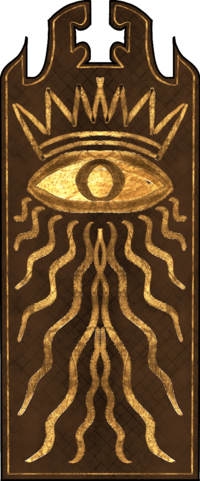 | |
| Religion | |
| Pronunciation | Union-ism |
| Origins | Emperor Theomar |
| Deities | |
| The Everwatcher and various other Gods and Goddesses | |
Unionism is the world's second-largest religion only trailing shortly after Estelley, on account of the Ailor people being more religiously divided, though it is speculated that Unionism will become the largest religion within a century at least. Unionism at its core is a global unification movement that proclaims the benevolence of the divinely inspired Emperors of the Regalian Empire to bring order, stability, and law to the world that is filled with chaos and strife. Unionism is the only Religion on Aloria that incorporates Gods of their subjugated or annexed people, preserving their culture and traditions as a part of a larger collective.
Origins
Unionism was founded several years after the Establishment of the Regalian Empire, roughly speaking in the year 10 AC. The exact year date is unclear, because Theomar did not publish the Creed until some time after he received his first visions, and so some theological debate exists on the exact founding year. Emperor Theomar was the first prophet of the faith and recorded the visions of the Everwatcher who joined with his soul, thus Theomar became the first Vessel-Emperor. Unionism has since its founding had a strong upward trajectory of converting those of other Religions to it, but also just population growth in general due to its strong message of expansion of the state and family. It is currently the second largest Religion in the world, only slightly outclassed by Estelley on account of there being more Elves widely speaking.
Central Message
The central message of Unionism is that the world is a wretched test of virtue for all mortals who reside in it, and that the greatest test of all is the unification of the world under the secular authority of the Emperors of Regalia. In essence, the faith preaches that the world is filled with chaos and suffering and that only through the guidance of the Regalian Empire's authority it can be unified. When this task called the Great Way is completed, the Everwatcher will create paradise on the world, ending all death and suffering, and bringing back all those who have passed into the afterlife to live among the now immortal mortals in a state of forever paradise.
The Great Way
The Great Way is the task of the faithful to bring about a world-spanning Regalian Empire under the secular authority of the Regalian Emperors. This explicitly does not mean the eradication of other Religions, it purely means that the whole world should follow Regalian state law and be obedient to it, while preserving their own customs and traditions. However, many also interpret it as an implicit call to eradicate other Religions. Unionism is a complicated Religion that professes to do a lot of good, but that is inherently hampered by the selfish wishes of mortals and the self-interested preaching of the clergy. It contains themes of righteousness bogged down by dogmatic narrow-mindedness, and stagnating beliefs.
The Afterlife
Unionism's afterlife is far less colorful or pleasure-inducing than many other Afterlives, it is in fact quite simple. Unlike the paradises of liquor and endless banquets, Unionism's afterlife is a somber staircase upon which all the faithful sit in waiting, gazing down at the world of mortals and watching events unfold until it is their time to descend back down to the land of the living when the Everwatcher creates paradise. There is a sense of togetherness for those who will return to loved ones in the Afterlife, but also a sense of waiting for eternity due to the slow progression of the Great Way, and the many setbacks the Regalian Empire faces in its implicit world-domination plans.
Faith Mechanic
Gods and Goddesses
Unionist Gods were either Gods from other Religions, or divinely blessed mortals who became immortal Gods after they passed on with the guidance of the Everwatcher. There is no important distinction between the types of Gods, Unionism treats all Gods equally under the Everwatcher. Each God also has associated Saints who become Immortal divine beings, but are not considered Gods, and discussed further down. The Everwatcher is technically the Arch-God, but this entity is so unknowable to anyone but the Emperor, that it is only invoked, not directly worshiped. The Everwatcher is treated as the creator of all the Gods, but the Gods are like tangible extensions of it, and thus they receive the worship instead.
Theomar, the Father
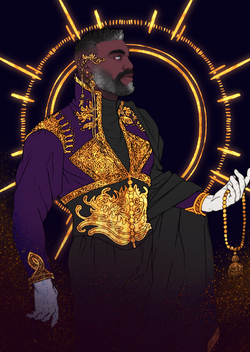
Theomar was the first prophet-Emperor of Unionism, the first Vessel of the Everwatcher, and the first to speak and write the holy word of the faith in the Creed. When the Regalian Empire was young, he was its first Emperor, having joined forces with the other major families in the Five Family Rebellion to overthrow the Kingdom of Amelore, banish the Bel Hammon Elves, and establish the Empire. Shortly after, he received visions and direct communication from the Everwatcher, who taught him the vision of Unionism. In life, he was considered a highly spiritual and immensely wise person, one of the tranquil Emperors of the Regalian Empire who did not wage wars, but convinced people foreign and his own to accept the word of the faith.
Theomar is the leader of the Unionist Pantheon and is often considered beyond reproach. While some of the other Gods lived flawed and sinful lives, Theomar represents an unblemished purity of the soul. He is the patron of anyone in the spiritual role of father or caretaker, leaders, generals, commanders, etc. From him, the faithful learn patience, diligence, and spiritual directives, even if Theomar himself is the least active of the Unionist Gods when appearing before the faithful or acting on their behalf as Divine intervention.
Ness, the Mother
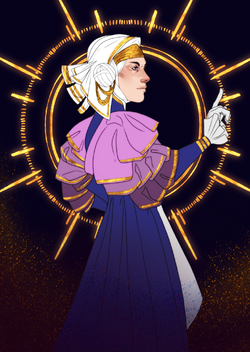
Ness was the 4th Empress of Regalia Nessaria Calontir, known in her early life as a woman of sinful indulgence and trustworthiness. Her life was filled with the pleasures of the Imperial royal court, absconding her duties and court protocols to reign as the mistress of the court. When her children were killed in a court conspiracy, a chance encounter with the assassins in prison changed her. It was said the Everwatcher spoke to her in her deepest moment of grief and blessed her with forgiveness and a nurturing spirit. From that moment on she donned the robe of the nurse vowing to bestow the blessing of care onto the sick and dying, that which had been denied her own children. She eventually passed on at the height of adoration by the people, a contrast to her early life.
Ness is the caretaker and nurturing mother of the pantheon, representing the idea that it is never too late to abandon one's wicked ways and reform in virtue. She is the patron of anyone in the spiritual role of mother or medical staff, midwives, healers, and those seeking to reform criminals to the light of the law. From her, the faithful learn compassion, sacrifice, and regret. Ness appears when the faithful need her the most when the only thing standing between them and certain death is her forgiving and healing light by their side.
Grace, the Custodian
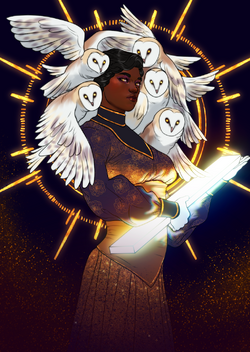
Grace was an old Hecarian Goddess, the spiritual leader of the Hecarian tribes that joined the Regalian Empire early in its creation but after Theomar spread his gospel. Grace (or Glanzia as she was called by them), was the Goddess mother of the night, bringing wisdom and judgment through her all-seeing owls. When the Regalian Empire peacefully integrated the Hecarian tribes through marriage by the hand of an Imperial Princess, Grace was incorporated into the Unionist Pantheon along with the other Gods from other Religions by her own free will. From that moment on, she became the Goddess of purity of soul and body, the custodian guiding the faithful to remain free of sinful corruption by otherworldly agents and to be judged by her gaze should they fall.
Grace is the protector of the purity of the faithful, with one hand shielding them from the corrupting influences of the other Dimensions, and with the other judging them should they fall to its vices and become agents of destruction. Her laws have ultimately been re-interpreted as a call for complete anti-magical/Occult purity, but her teachings to the faithful are more about controlling these things, not being controlled by it. She has granted the faithful Purestone, a material that rejects the Occult and protects the faithful from Magical harm.
Allest, the Champion
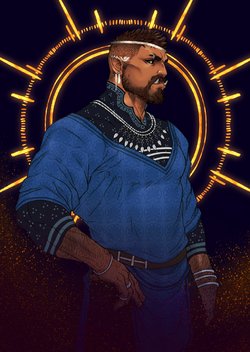
Allest was the 17th Emperor of Regalia Allestrain I Ivrae who lived an angry and violent life. Being one of the few Eronidas Emperors of Regalia, he oversaw some of Regalia's most brutal wars of expansion particularly against the Velheim people. He however also dealt his own nobles an unjust hand, often ignoring the law and justice system in favor of honor duels that would end in a bloodbath. It is said, however, that by the guidance of his Chancellor Alexander the First (nicknamed Brand), he found religious purpose and divine directive. His anger was channeled into the arena where he became a glorious gladiator-emperor, and his combat prowess to foreign wars. With all his rage vented, his rule became one of strict but fair discipline that saw major legislative expansions.
Allest is the Lion-God of the pantheon, the patron of soldiers and gladiators, teaching them honesty, and bravery, and praying for victory. It is known by the faithful, however, that his soul was ensnared by wicked plots from the Vola Fornoss Gods to punish him for the crusades and genocide against their people. As such, his divine throne in the Pantheon remains empty, with his Saint Brand appearing to those who invoke or pray to his name, as he cannot hear them while imprisoned in the hellish Demon-realm of Vaarda, the Vola afterlife.
Caan, The Magus
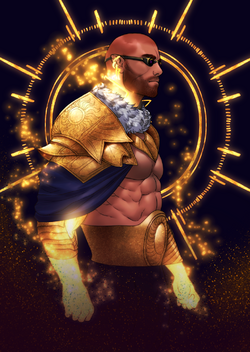
Caan was an old Breizh God, the leader of the Santel pantheon, who both led the people of Kintyr to join the Five Family Rebellion and in founding the Aelrrigan Order prior. Because Caan was present when the Regalian Empire was founded, he was the first God from another faith to voluntarily join the Unionist pantheon, making the other Santel Gods his saints. While all Santels had white feathered wings, it is said that Caan removed his wings as a virtuous sacrifice to walk more closely with mortals and understand their plight and needs. Over time, however, he has seemingly become more detached and cynical. While he still lives among mortals as a God, he has become quiet and unresponsive, which many of the faithful have blamed on the constant abuse of Magic in the Empire.
Caan is the patron God of all the Mages and those gifted with Magic in the Empire, teaching them responsible use of their Magic and to use their gift or burden for the Good of the Empire, not to spite it. He is by far the most active of the Gods among mortals because he leads the Aelrrigan Order after ousting the mortal leadership he put in place centuries ago, but comes and goes without rhyme or reason, having fallen into a melancholic unapproachability that makes even the faithful uneasy to be around him when he appears in person.
Elia, the Huntress
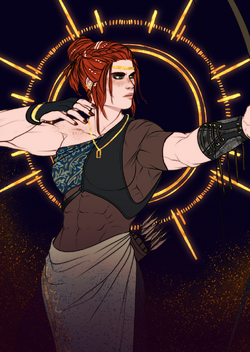
Elia was the Empress-wife of Emperor Allestrain (the God Allest) who had a difficult life. Originally destined to become a Knight, she was forced to surrender her life ambitions and goals when the Emperor chose her for a marriage (later known as a beard marriage). Her obsession with Knights and her dreams made her a terrible Empress, but much like her husband, she found guidance from the Chancellor's wife Leona who would later go on to become her Saint. While Elia was prone to fits of obsessive compulsion, Leona was her temperance, bending her uncollected and uncoordinated actions and thoughts into precision actions and decisions. She carried on the work of her husband after he was killed by the Vola Gods, and finished the work of war against the Skags.
Elia is the patron Goddess of Knights and hunters, but also more widely speaking anyone who needs to cast away distractions in favor of single-minded focus and concentration. She teaches the virtues of calmness, self-control, and clarity, so that the faithful remain aware and truthful to themselves, and act without a shroud in their mind onto others. Elia was a multi-discipline warrior famed with bow and halberd alike, and thus prayed to by the faithful for skill in weapons to protect their loved ones or the Empire.
Nolven, the Twin
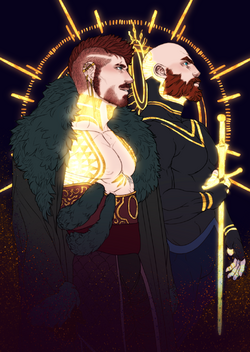
Nolven was a refracted God, a fragment of the Fornoss Vola God Aedán that disavowed that faith, and joined Unionism instead. Nolven however has a split identity due to his fractured nature. In some seasons he is Nolven the god of war and punisher of the enemies of Unionism, smashing idols of other Religions and casting down enemies of the faith, while in other seasons he is Nolven the god of art and beauty who creates art so profound it makes even the most brutish of warriors weep. His fractured identity means he is as unpredictable as the shifting seasons or the tides of the ocean, representing a constant push and pull of destruction and war, and creation and peace. Nolven in times of war has a particular bone to pick with the Pagan faiths of the Regalian Empire.
Nolven is the patron of art and culture, and crusade and iconoclasm at once. He represents the constant flux between creating art to destroy and destroying to create art. In him are embodied the ability of art to dear down systems, ideas, even Empires, and the need for tragedy and destruction to take place to inspire the greatest of artistic expressions. He represents the need for the faithful to be nuanced complex people, to live the spoken virtues of the Gods but with temperance of change and flaw to be true thinking and living people.
Juvin, the Teacher
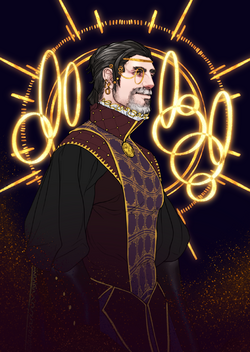
Juvin was the 11th Emperor of Regalia Heinrich III Ivrae, who was both a pious priestly man and a strong contender for the most intellectually gifted Emperor of the Regalian Empire, championing the causes of science and knowledge and dragging the relatively backwater war-like Empire at the time into a more modern understanding of the world. While the Empire expanded in knowledge and piety under his rule, many of its intellectual centers became narrow-minded and chased only dogma information that conformed to their worldview. Despite Juvin's best intentions, his relatively short mortal life did not allow for the institutions he made to survive beyond his reign, many of them folding back into ignorance, leading many to believe Regalia's sciences are backward.
Juvin is the patron God of scholars, teachers, mentors, sages, and scribes. He inspires wisdom to perceive the world and is prayed to for divine insight and inspiration when problems seem unsolvable. It is said that Juvin often appears in the largest of Imperial archives, seeking to help scholars. In a stroke of irony, priests have made this archive inaccessible, fearing the wrong information would be exposed to Juvin, thus creating more ignorance. Juvin's tragedy is that his desire for inspiring wisdom and learning is yet restrained by the clergy.
Mendes, the Bestower
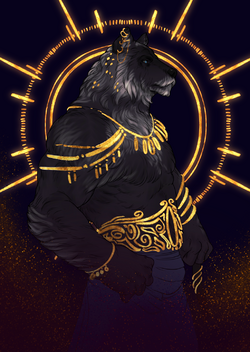
Mendes came to Unionism as a former Khama God, once belonging to the Dewamenet Empire but fleeing the Pearl Wars and eventually joining the Regalian Empire with his flock. Mendes was the leader of the Golden Fleet, an Asha migrant fleet that had grown tired of running, and wanted to settle. Mendes led them to Regalia, where an agreement with Theomar was struck for them to live in Regalia, becoming the first large foreign migrant wave. Mendes then became a prosperity God for Unionism in continuation of his prior role in the Khama faith. There are still those in the Khama faith who try to draw him back to their pantheon, but he insists he is not interested in subjecting himself to Tjafar, and has found true wealth of belonging under the Everwatcher.
Mendes is the patron God of merchants and traders, of shopkeepers and of bureaucrats working in finance. He is prayed to for good fortune and fair winds for trade ships, and sometimes even talked with regarding financial deals or plans. Mendes is one of the few Gods that can reliably be found in one singular location: The High House of the Imperial Coinage, though access to him is extremely restricted to only those deemed of sufficient piety by the priests, which is a tall order in such a viciously crook-capitalist field.
Al-Asir, the Creator
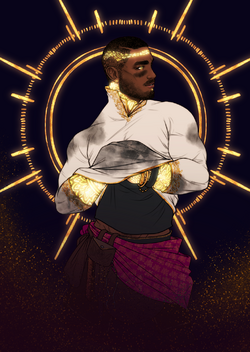
Al-Asir came to Unionism very recently as the Dragon Marik was re-birthed by the Everwatcher even before the return of Dragons. Al-Asir is a technician God, an engineer of kindness at heart who seeks to make the world a better place. Yet, his nature brings about some controversy, particularly among the Skyborn and Dragonborn. His nature as Marik is not disputed, rather, the Dragonborn claim he is Marik first and Al-Asir second, while the Skyborn claim he is Al-Asir first and Marik second. Which version is truth matters to these people, due to their long historic animosity and continuing wars in their homeland of Ard-al-Nur. Al-Asir continues to dance between truths, preferring to show kindness to all instead of choosing one side.
Al-Asir is the patron of engineers and technicians, but also more widely speaking for everyone seeking to do kindness without payment. While his technician-God themes are obvious, Al-Asir is also a God of good-natured hospitality, well-wishes, gratuity, and charity to others. He uses his technology to improve the lives of others and ease their suffering, a stark contrast to the Regalian Empire's wide usage of technology to wage wars and more efficiently kill, something that he has said deeply troubles him.
Schism Gods
The Schism Gods are not members of the official pantheon and should be seen as optional or additional Gods. Each Schism God represents a belief that is technically against the dogma of the main religion, but is acceptable within the margins to promote religious cohesion, and to prevent the faith from fracturing into 5 different versions of Unionism. These Gods are tolerated on the fringes of Unionism, but there is still a healthy amount of internal conflict and derision against those that hold to the Schismatic beliefs that some of the dogmatic believers find repugnant.
Morgan, the Wicked
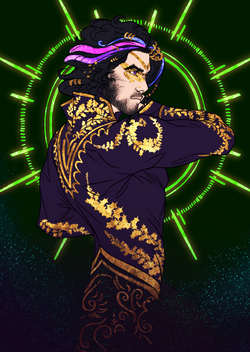
Morgan is a complex character from a historical point of view. He is remembered as one of the worst Chancellors from a moral perspective, but one of the best from a pragmatic perspective. Morgan was cruel, sadistic, extravagant, and immensely skilled, controlling nearly every layer of Regalian upper class society by himself and leaving behind permanent imprints on whatever he touched that have lived long past his death. Among Guided Unionists (those that worship him), the belief is held that Morgan is like an eternal mirror of self-reflection upon the corrupting qualities of the most blessed of the Empire. While propaganda upholds that he was unequivocally an evil man, reality reflects a more complex image from which other lessons can be learned.
Guided Unionists see Morgan as an example God to be fear-worshiped for humility, respect, and loyalty. Through him, Guided Unionists question the narrative, question the information they are fed, and hold their leaders and clergy to account. This makes Guided Unionist a schismatic belief because it goes against the grain of the infallibility of the clergy. Guided Unionists reject the clergy in favor of lay priests who ask them why, instead of commanding them how. Guided Unionism is particularly prevalent among Anglians and Cantaluna Ailor.
Belialus, the Everchanger
- Note, some of this lore relies on a Spirit/Magic rework that is not yet released. As such, some info may be contradictory to current lore.
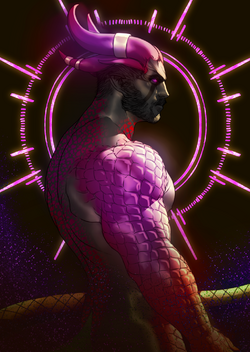
Belialus is a Demon, no ifs and buts about it. Belialus submitted himself to Unionism and the Everwatcher early, just after Theomar's death. The kneejerk reaction of the faithful at the time was to utterly reject him and his followers, thus resulting in the first Schism which resulted in a lot of violence and the eventual expulsion of the Evintarian believers to the isle of Aetosil outside of the Empire. Belialus is a Demon-God not unlike the Arken-God refractions, yet different. He represents the desire of Spirits to live in Aloria and become part of the Alorian fabric of life, but on the terms set out by the Everwatcher and in rejection of their nature. Belialus himself is a Demon of Change, and has brought the Saint-Demons of Changing Fates with him to bless the people with their gifts.
Belialus is perhaps best explained as the Patron-God of those who deal with Demons and otherworldly entities. This makes him the most controversial of the schismatic Gods, because he stands almost directly opposed to Grace (who has tried to kill him at least three times already). Belialus himself, however, is repentant of his Demonic nature, and his followers both preach safe conduct with otherworldly entities and Veilwalking, while bowing to the Great Way. Note, even if Belialus worship is legal, Spirits are still deemed illegal in the Regalian Empire. Belialus worshipers are also routinely targeted by vigilantes of the dogmatic belief, who inflict violence on them despite the official acceptance of their schism.
Finell, the Tidelover
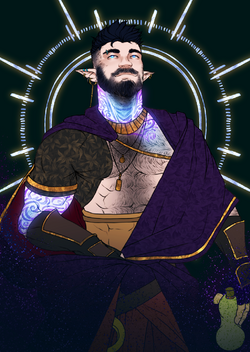
Finell is the closest Unionism has to a love-god, as the majority of the Religion is quite chaste in its approach to intimacy. Finell was once an Elven Prince and the first of the Finul Elves and patron of Bel Faiaal. He ascended Godhood in life, becoming an unofficial God of revelry, party and pleasures to the Elves. The Empresses however rejected him, because he was wild and uncoordinated, his self-serving attitude and apathy to the virtues of perfection a contradiction to the faith. He was banished from the Allorn Empire and became a sea-wandering God only occasionally interacting with his people, until one day he set foot in Regalia and never left. Thus, he became the Enelon Unionist schismatic god of love and revelry who bends the Great Way to far beyond its original intentions.
Finell preaches for the virtues of Unionism, the Great Way, to extend beyond the confines of legal authority, and to break down the barriers of decency, arbitrary law, and heritage. Finell preaches for unrestraint normalization of love and intimacy for all, to do away with jealousy, and to break down heritage and culture barriers, and homogenize all people of Aloria into one loving unity. Many of the dogmatic believers reject Enelon Unionism as debauched and adulterous, while Enelon faithful chastise the dogmatic believers for being culturally divisive.
Priestly Activities
The Unionist College (what the church of Unionism is collectively called) is a vast sprawling network of clerics and clerks that combine ecclesiastic and secular control of the people. It is a difficult to understand organization, due to its many obvious and less obvious interconnected agencies and organizations that are not always aware of each other. The Unionist College could be considered a state within a state, it has its own army, its own secret service, and its own ministerial positions as well as its own treasury. There is a constant tug and pull between the Regalian Empire's nobility, and its clergy, who wield the words of the prophets to get their way. To many, this makes the Unionist College a very powerful enemy. Indeed, while many of the rank-and-file priests may have good intentions, the Unionist College is a strong political component of the Regalian Empire, one that is just as self-interested and perhaps corrupt as the secular rulers are. On the ground, priests are called either priest or Celates, who in turn control a Celery. A Celery is a grant of land given to a priest by a secular ruler of the Emperor, or a higher priest, with the intent to administer to the flock or manage a monastery or nunnery in the area. While most priests of other religions are purely invested in religious teachings, Unionist priests are very much nobility in their own right, with tax dues and subjects who pay tithes and often even serve in the ecclesiastic guard. When playing a priest, any kind of role is viable, whether you want to play a corrupt priest who is using the words of the Gods for their own benefit, or a priest who is trying to make the best of a difficult situation and guide the flock to the best of their abilities without falling to vice.
Expanded Lore
The Expanded Lore section contains additional contextual information about the Unionist faith. This section is not necessary to read to get a good understanding of the lore, just the background information.
Saints
Unionism is the only Religion that has a semi-divinity concept of saints, mortals who are made immortal either in life or after death as part of the personal retinue of one of the Unionist Gods or Goddesses. These Saints are not directly worshiped but are symbolic and often invoked by name to inspire the faithful with their stories and their deeds. Saints are people to live like or examples to live by, not to worship. Each God has a flock of Saints, some more than others, and below is a list of all currently publicly available Saints to give more substance to their lore.
- This section still needs to be expanded to bring back some of the lore lost in the previous revision, but is considered Expanded Lore so is deferred.
Saints of Theomar
- Thedmir the Ally
Saints of Ness
- Eora the Companion
Saints of Grace
- None yet written
Saints of Allest
- Brand the Lover
Saints of Caan
- Kaldric the Repentant
- Eirlys the Winged
Saints of Elia
- Leona the Squire
Saints of Nolven
- None yet written
Saints of Juvin
- Almar the Justicar
Saints of Mendes
- Hor the Guard
Saints of Al-Asir
- Marani the Repentant
Saints of Morgan
- Narsil the Everloyal
- Nicholas the Architect
- Regulus the Dragonblood
Saints of Belialus
- Yvasi the Trueself
- Freiderikos the Newself
- Kithemon the Mindself
- Amandaros the Lovedself
Saints of Finell
- None yet written
Trivia
- Unionism used to be mandatory for nobility somewhere during the second century after Cataclysm, though this Holy Law was removed when the war against the Skagger Horde ceased, and the Empire benefited more from including non-Unionists into the peerage. An exception had always been made for the Solvaan nobles in Solleria however, called the Confessions of Melennar.
- Sectarian violence largely came to an end at the turn into the fourth century as the last attacks on Vultragon Unionist by state forces ceased, and an uneasy truce was signed between the Schism religious communities. They still do not see eye-to-eye, and the different Schismatic groups still prod at each other, but instead of murdering each other over sectarian differences, they mostly fight with words nowadays, a legacy of the Kleine Rechnung, the document that called for the truce.
- Despite Caan's absorption into Unionism, the Breizh still maintained a high level of cultural autonomy, some even clinging to old beliefs. As such, even when Magic became illegal in the Empire, the Breizh Aelrrigan Order continued to find and train Mages safely in their sanctuaries while the rest of the Empire turned to brutal oppression (and the Magic part of Caan was suppressed from dogma). Caan' faithful among the Aelrrigan Order are commonly cited as the reason why Magic acceptance eventually returned, and Caan' magical nature in theological teachings was returned.
| ||||||||||
| Accreditation | |||||||
|---|---|---|---|---|---|---|---|
|
| ||||||